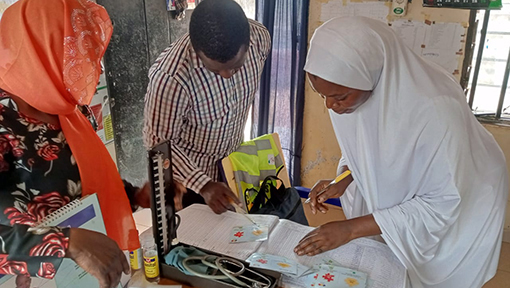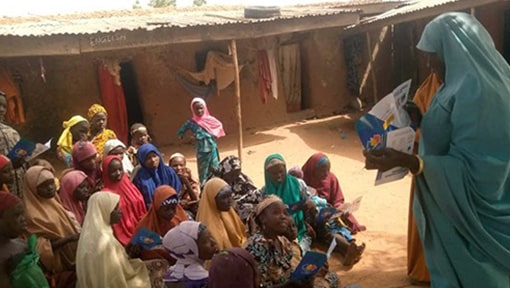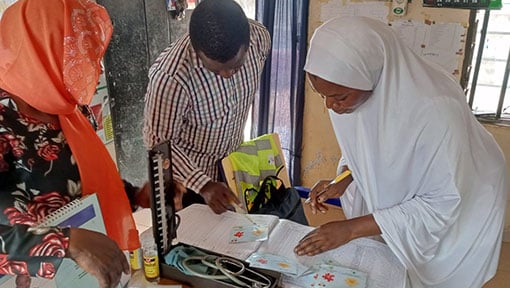The Challenge Initiative Lets Stakeholders Pay a Virtual Visit to Abidjan in Cote d’Ivoire
Contributors: Fatimata Sow and Annette McFarland
As the COVID-19 pandemic continues to disrupt travel, The Challenge Initiative (TCI) in Francophone West Africa (FWA) recently devised a creative way to allow its global stakeholders to virtually do a site visit to Abidjan, a TCI-supported city in Côte d’Ivoire. This visit offered an opportunity to see how the local government and health officials there are implementing TCI’s high-impact family planning and adolescent and youth sexual and reproductive health (AYSRH) best practices. A TCI webinar held in May featured three pre-recorded videos, live presentations by key stakeholders, a live video tour of a health center during a Family Planning Special Day – one of TCI’s high-impact best practices – and a review of the data.
In the first video, three local government stakeholders outlined their roles in TCI in Abidjan. Jean Jacques Yapo, of UVICOCI (l’Union des Villes et Communes de Cote d’Ivoire), explained how he and his team at UVICOCI coordinate and monitor TCI program approaches across six of the 10 municipalities (communes) in Abidjan. Mahoussa Barro, the TCI Focal Person for the municipality of Abobo, detailed how they engage municipal counselors, market women and civil servants so that they take ownership of TCI’s demand generation activities and promote family planning in their communities. Issifou Coulibaly, the Deputy Mayor for the municipality of Yopougon, mentioned the financial commitment Yopougon made of 20 million CFA (approx. $36,900) in their Expression of Interest. Coulibaly reported that Yopougon has disbursed all committed funds to ensure the implementation of TCI’s best practices.
After the video aired, Yapo shared his reflections with webinar attendees in real time. He said he believes TCI’s ‘business unusual’ model has empowered municipalities and health districts to better coordinate and more effectively promote family planning and AYSRH in their communities. Fatoumata Djiré, the Second Deputy Mayor of the municipality of Koumassi, was also on hand to give her perspective. She said the TCI model gave her municipality the opportunity to engage in health activities as they had not done before, given the fixed mindset that health activities are the sole responsibility of the health district. As a result of TCI, political leaders and community members have now adopted a growth mindset in which they can see their role in health service delivery. Koumassi has made connections with the health district that will endure beyond the life of TCI in Abidjan, and Djiré said she is very pleased with the results she has seen thus far.
The TCI Model: Municipal Engagement for Local Ownership and System Readiness
In the second video, Bienvenu Yao, the Country Program Manager for TCI in Côte d’Ivoire, mapped out the entities participating in TCI in Abidjan: the coordinating body UVICOCI, the six implementing municipalities and the health system, represented by two regional health departments and eight health districts. Monique Coulibaly, a midwife in Abobo East, said she is using TCI’s universal referral approach (Identification Systématique des Besoins du Client) to ask all women at her health center if they need family planning services, regardless of the original reason for their visit. Coulibaly was also trained to better serve adolescent and youth clients by providing bias and judgement-free services (Reduction des Biais des Prestataires). As a result, she has seen attendance for family planning services improve.
Overview: TCI Interventions in the City of Abidjan, Cote d’Ivoire
Jeunes Leaders Transformationnels in Their Own Words
Following the pre-recorded videos and question and answer sessions, the webinar featured a live visit to a Family Planning Special Day (Journées Spéciales d’offre gratuite de services de Planification Familiale, or JSPF) at a health center in Yopougon, giving webinar attendees an opportunity to hear directly from a midwife, Madame Linda Ahoua. She said her health center typically sees 200-210 family planning clients during a typical Family Planning Special Day, including 120-130 new users. Many clients attend Family Planning Special Days for the opportunity to take up a long-acting reversible contraceptive (LARC) method at no cost. Implants, for example, can last for three years but are expensive and frequently out of stock.
Finally, TCI presented data that demonstrates how its activities are contributing to family planning uptake in Abidjan, highlighting project-level and HMIS2 data. TCI supports 122 of 232 (53%) health facilities in Abidjan. There have been many successes as well as challenges (e.g., only the municipality of Yopougon has mobilized and released the funds they committed). TCI commended the health centers it supports in Abidjan for adapting and continuing to provide family planning services throughout the COVID-19 pandemic.
As international travel remains restricted, having the opportunity to visit a supported health facility, speak with health workers and hear from commitment makers first hand offered site visit participants a comprehensive and engaging view of the program. TCI plans to continue refining and using this approach in FWA as a way to let more people “travel” to their sites and experience the implementation of TCI approaches in real-time.






